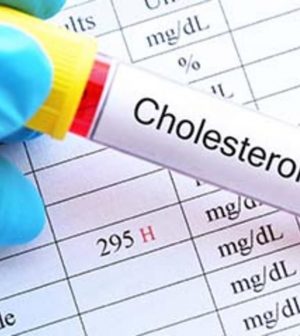- Could Your Grocery Store Meat Be Causing Recurring UTIs?
- Are You Making This Expensive Thermostat Error This Winter?
- Recognizing the Signs of Hypothyroidism
- 10 Strategies to Overcome Insomnia
- Could Artificial Sweeteners Be Aging the Brain Faster?
- Techniques for Soothing Your Nervous System
- Does the Water in Your House Smell Funny? Here’s Why
- Can a Daily Dose of Apple Cider Vinegar Actually Aid Weight Loss?
- 6 Health Beverages That Can Actually Spike Your Blood Sugar
- Treatment Options for Social Anxiety Disorder
How HDL ‘Good’ Cholesterol Might Raise Dementia Risk

While HDL cholesterol is considered the “good” kind for heart and brain health, too much or too little of it may up a person’s risk of dementia, new research suggests.
“This study is especially informative because of the large number of participants and long follow-up,” noted study author Maria Glymour, of Boston University. She said her team was able to “study the links with dementia across the range of cholesterol levels and achieve precise estimates, even for people with cholesterol levels that are quite high or quite low.”
Still, that can’t prove that high or low levels of HDL cholesterol actually cause dementia, the American Academy of Neurology (AAN) cautioned in its news release about the study.
To learn more about the potential connection, researchers studied data on more than 184,000 people from the Kaiser Permanente Northern California Health Plan, with an average age of 70. The patients did not have dementia at the start of the study.
The participants filled out a survey on their health behaviors and had their cholesterol levels measured during routine health care visits an average of 2.5 times in the following two years.
These people were then followed with their electronic health records for an average of nine years.
More than 25,000 study participants developed dementia during that time.
The average HDL cholesterol level for people in the study was 53.7 milligrams per deciliter (mg/dL). Healthy levels are above 40 mg/dL for men and above 50 mg/dL for women.
The research team divided the participants into five groups based on their HDL cholesterol levels. Those with the highest levels of HDL cholesterol (65 mg/dL or higher) had a 15% higher rate of dementia compared to those in the middle group. But those with the lowest levels (11 to 41 mg/dL) also had higher dementia rates, even though those higher rates were lower than their high-cholesterol peers. They had a 7% higher rate of dementia compared to the middle group.
Researchers also looked at LDL, or “bad,” cholesterol, but found only a slight association with the risk of dementia.
The findings were published online Oct. 4 in Neurology, the medical journal of the American Academy of Neurology.
“The elevation in dementia risk with both high and low levels of HDL cholesterol was unexpected, but these increases are small, and their clinical significance is uncertain,” Glymour said in the AAN news release. “In contrast, we found no association between LDL cholesterol and dementia risk in the overall study cohort. Our results add to evidence that HDL cholesterol has similarly complex associations with dementia as with heart disease and cancer.”
Dr. Howard Weintraub, clinical director of the Center for the Prevention of Cardiovascular Disease at NYU Langone Heart in New York, said the findings were unexpected.
“When people have HDL that’s 90 or 100 mg/dL, that is associated with dementia. But not these lower numbers, 63 mg/dL or so,” Weintraub told NBC News.
More information
The American Heart Association has more on cholesterol.
SOURCE: American Academy of Neurology, news release, Oct. 4, 2023; NBC News
Source: HealthDay
Copyright © 2026 HealthDay. All rights reserved.










